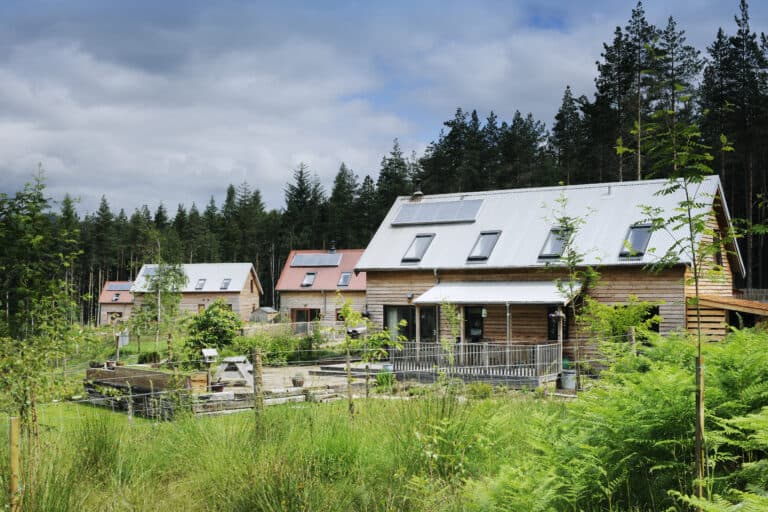This blog is part of a monthly series about community-led housing in Scotland, jointly written by Mike Staples, Chief Executive at South of Scotland Community Housing (SOSCH), and Ronnie MacRae, Chief Executive at Communities Housing Trust (CHT). Between us we’ve worked with hundreds of communities across Scotland, facilitating well over 1,000 affordable homes.
In 2012, seven apprentices were taken on to help build six affordable homes in the Cairngorms National Park, as part of a skills training programme to boost crucial rural trades.
Ten years later, three are still with the same local contractor, AW Laing. The rest have been taken on by other contractors in the area.
The ten homes at Ardgeal near Kincraig were an exemplar community-led development by the Communities Housing Trust, using a former Forestry & Land Scotland site where all timber felled and material excavated was used on site. The homes have minimal impact on the environment and are efficient to run. But beyond this, they provided needed job opportunities for young people and boost rural construction trades.
The apprentice programme was one of many ways the project looked at long-term sustainability. All felled timber was milled on site and some was provided for an outdoor classroom at the local primary school, whose numbers were increased with new families moving to the ten homes.

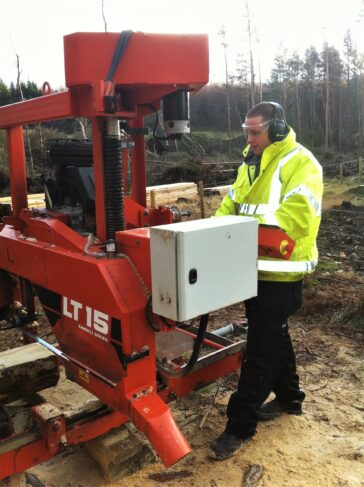
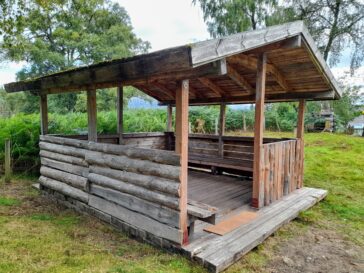
In the remote community of Glentrool, on the edge of the Galloway Forest Park, Glentrool & Bargrennan Community Trust appointed Broatch Construction to redevelop three homes into affordable, family housing. The work was completed in March 2022, helped along by a team which included four apprentices.
A trainee electrician, a plumber, and two joiners worked on the redevelopment project, all recruited from the local surrounding area. The apprentices used advanced, climate- friendly approaches, including implement new solar-powered heating systems, to create beautiful and high-quality homes for incoming families. The project also allowed for practical ‘green-build’ experience for young professionals along the way.
South of Scotland Community Housing is also partnering with South of Scotland Enterprise and community organisations, including Dumfriesshire East Community Benefit Group, to develop a programme of skills- building for low-energy retrofits. These schemes will be jointly delivered with funders and communities to support an inclusive transition to net-zero in the construction and housing sectors.

‘Just’ building a house can be so much more – and we need to provide thousands more affordable homes in Scotland. The associated benefits from a community-led approach are significant.
Establishing skills development programmes to help deliver community-led housing is an effective way to:
- attract and/or retain talented young people in rural areas
- provide opportunities and investment within the local area, for the benefit of the wider community
- help grow rural trades and increase job opportunities
- shift skills towards ‘green’ or climate-conscious development practices
Opportunities for rural and regional growth
Rural trades are in crisis. Construction prices rose more than 27% from May 2021 to May 2022;[1] travel costs are through the roof; and labour is exceedingly hard to come by, especially in rural areas. Numbers of construction employees in Scotland fell by 9.2% in 2020 compared to 2019, whereas numbers increased in England and Wales.[2] Construction projects overall are costing 10-15% more compared to 1-2 years ago.[3] These create real knock-on impacts when a community is paying.
Since many construction firms and tradespeople are concentrated in the central belt, there is a growing need for regional skills.
With the push towards community-wealth building, there is a huge opportunity for regional supply chains as an investment priority for the development sector. By keeping contracts local, community housing projects have the potential to create new jobs and training opportunities. It also ensures wages stay local and are reinvested in nearby people, businesses and services.
This includes ongoing and long-term opportunities for repairs and maintenance, to establish or grow local companies which are more accessible and less expensive than companies who have to travel long-distance. This is a key aspect of viability and affordability of homes in rural areas.
Community-led housing simultaneously provides job opportunities in rural areas and tackles the skills shortage for the long-term, further supporting rural communities down the line. Secure jobs and housing mutually reinforce each other and are important parts of creating great places.
No Planet B
As for planetary considerations, there’s also the drive to repurpose empty buildings across Scotland. In Glendale, Skye, the renovation of the disused school will provide opportunities for students to do hands-on coursework units in retrofitting and recycling building materials, as well as CPD for those in related fields. This Glendale Trust and Communities Housing Trust project is working in partnership with Historic Environment Scotland, Zero Waste Scotland, Built Environment Smarter Transformation, and Climavore, to name just a few.
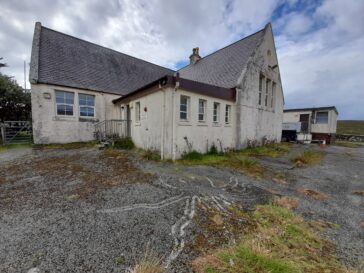
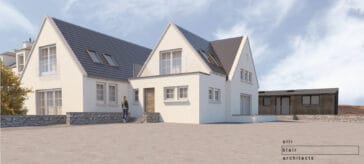
We can’t have ‘sustainable developments’ with exciting new ‘green’ materials that have to be shipped internationally and installed by experts from afar. So, looking holistically at climate conscious aspects common to community-led projects, local contractors and companies help do the following:
- Reduce travel by keeping skilled workers and materials close – less transport emissions for people and shipping building materials
- Keep community regeneration in the hands/power of local people – if we grow local development capacity, communities are not beholden to availability, skills, and materials from elsewhere.
Mainstream construction approaches don’t have all these added benefits. Community-led housing projects support local training and upskilling opportunities in places across Scotland. Investing in community-led projects not only creates homes for those in need, and supports climate goals, but also has positive knock-on effects for local economies. It is a self-supporting way of building capacity in rural or fragile communities.
References
[1] See UK Government’s Department for Business, Energy & Industrial Strategy monthly statistics: https://www.gov.uk/government/statistics/building-materials-and-components-statistics-june-2022
[2] ONS Construction Statistics GB 2020 https://www.ons.gov.uk/businessindustryandtrade/constructionindustry/articles/constructionstatistics/latest
[3] Communities Housing Trust & SOSCH projects at September 2022; own calculations.
